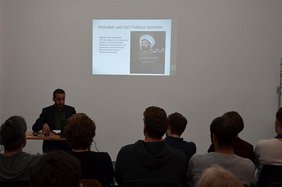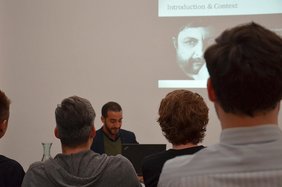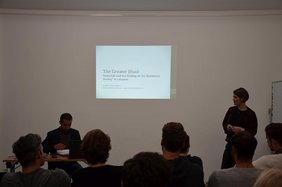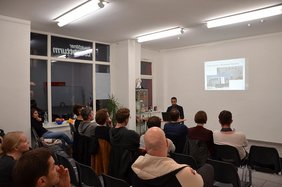Fouad is a lecturer and postdoctoral researcher at Freie Universität Berlin and Research Fellow at the Orient-Institut Beirut. He presented his latest research on the relations between Hizbullah and its supporters based on more than ten years of fieldwork in the Middle East. He first showed how Lebanon’s sectarian political system and the marginalization of Shi’ites in the region led first to the emergence of Shi’ite politico-religious groups with preachers acting as both spiritual and community leaders. Inspired by the Iranian revolution and exacerbated by Israel’s invasion of Lebanon in 1982, Hizbullah was then officially founded in 1985 with the aim of organizing the Shi’a community against both the Lebanese government and the Israeli occupation forces, using both militant resistance and the establishment of its own welfare organizations. Here, Hizbullah’s leaders saw the party as an all-encompassing project, the ‘Greater Jihad’ that creates an identity for its members, constructs us-versus-them distinctions, and establishes the ‘Resistance Society’ whose members share the core values of piety and resistance. For this reason, Fouad analyzes Hizbullah through a social movement lens, which in his opinion explains the dynamics between the party and its supporters better than approaches that focus on Hizbullah’s foreign ties or its military activities.
To establish and perpetuate this ‘Resistance Society’, Hizbullah and its supporters have created a complex web of movements and organizations. While the political leadership and its military wing are integrated in the party structure, and other organizations such as the Islamic Health Organization and the Al Mahdi boy scouts are directly controlled by Hizbullah, other organizations such as faith-based schools, mosques, and charitable foundations are not directly controlled by the party, but influenced by it. It is, for example, very common for party members to be first active and the military wing and then move on to another organization, be it as a local mayor, the head of a school which perpetuates Hizbullah’s ideology amongst the young, or as a producer of movies and TV shows that celebrate Hizbullah’s armed struggle. Hizbullah and affiliated organizations also try to offer additional venues that promote a pious lifestyle. This has led, amongst others, to the establishment of an amusement park that attracts the pious middle class, the opening of Beirut Mall which wants to provide a ‘family-friendly’ environment for young people while offering shopping, brands and amusement like similar malls in the US or in the Gulf states, and opportunities for ‘Resistance Tourism’ that seek to combine ‘fun and worship’ in tours to Iran with visits to religious sites, tourist attractions, and beach destinations. It is in these spaces, Fouad argued, that Hizbullah’s supporters create their own interpretations of the ‘Resistance Society’ and relate these interpretations back to the party elite, establishing it as a social phenomenon that is defined not only by the elite party members but also by Hizbullah’s ‘ordinary’ supporters.
In the following discussion, Fouad and the audience touched on several other topics, including Hizbullah’s engagement in the Syrian civil war, its relations to Israel, and how Hizbullah deals with faith-based development initiatives in Lebanon. We want to thank Fouad for his fascinating talk and the intensive discussion that followed it, and all attendees for their interest and their questions and comments.






